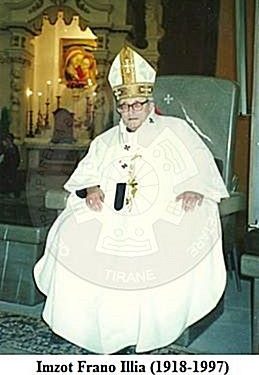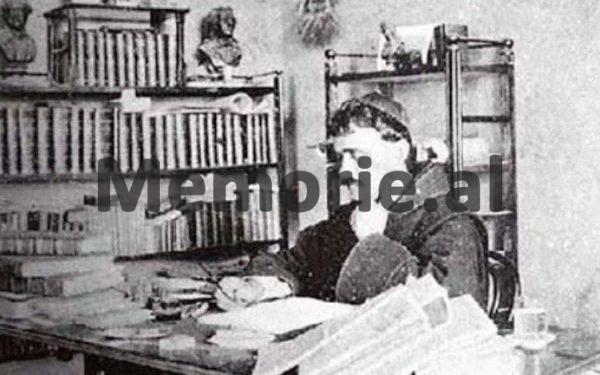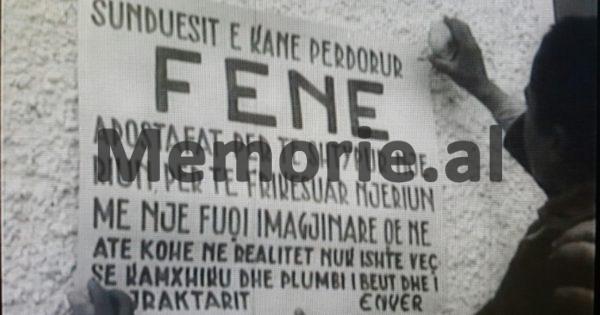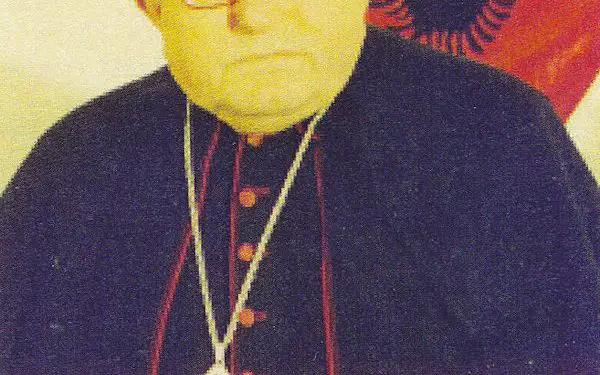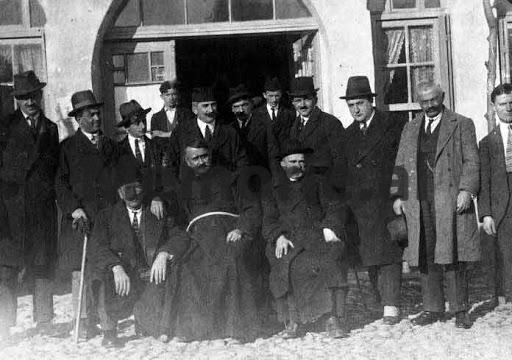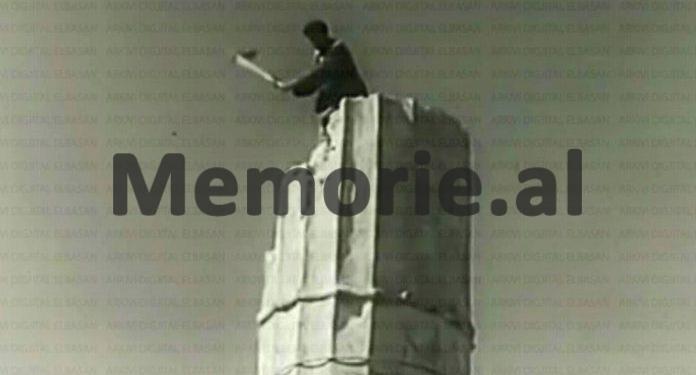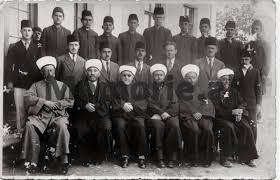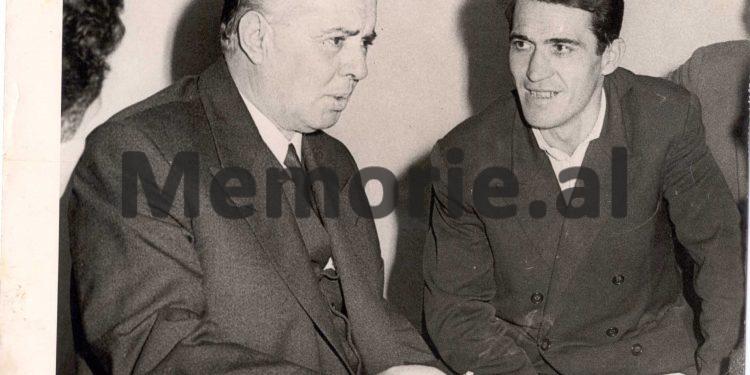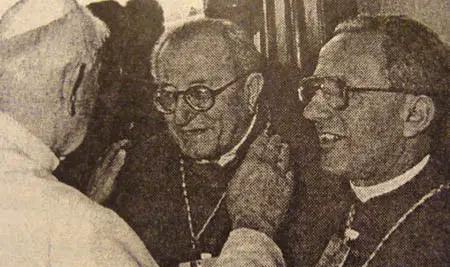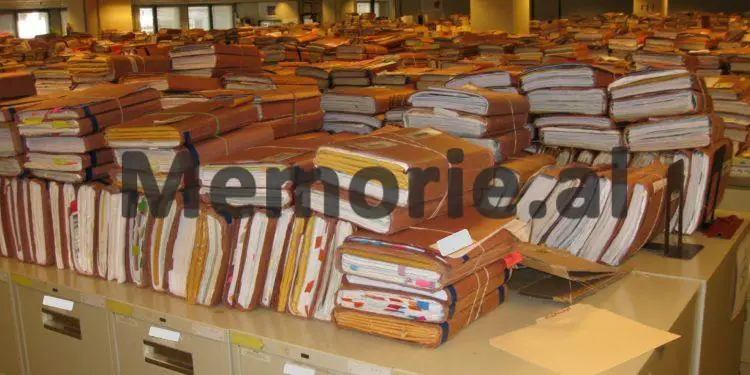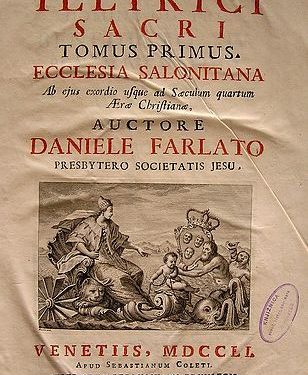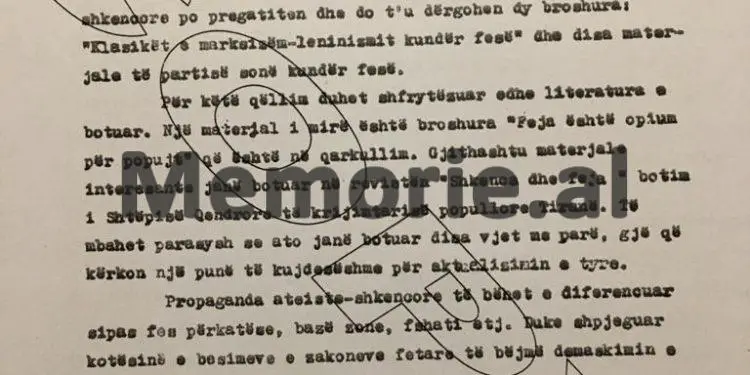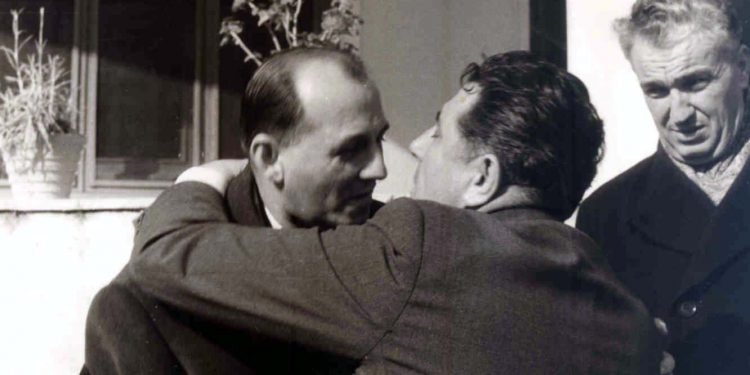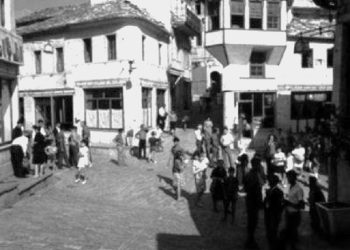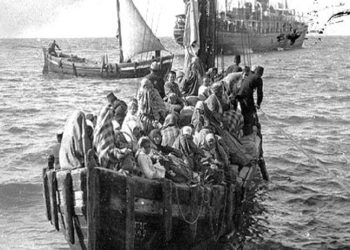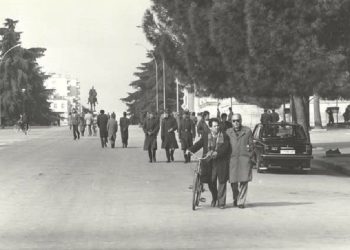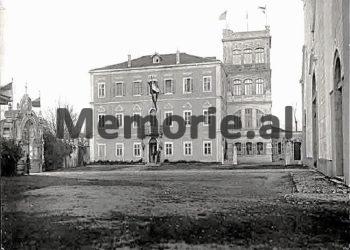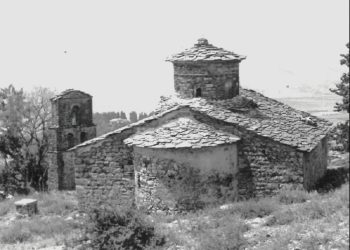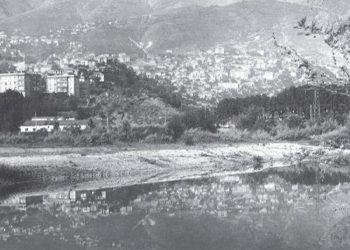Dashnor Kaloçi
Memorie.al publishes two archival documents unknown with the reports that the General Directorate of Albanian State Archives sent to Ramiz Alia in 1967, where he informed him about the archival documentation, the library fund with books, magazines, and newspapers, as well as many rare objects of great historical value that had been seized from religious religions in Albania, after the communist regime had legally banned religious belief and forcibly confiscated thousands of files from rare documents, such as the 1745 book printed in typography. of Voskopoja in Greek, where there were 29 curses in Albanian, the decree of Sultan Abdyl Mexhidi of 1839, which were found in the Metropolitan Church of Korça, to the complete collections of “Fjamuri i Arbërit” by De Rada, “Albania ”Of Faik Konica, documents of Fishta, Mjeda, and the rare correspondence of Noli with personalities of the time, which was seized in the Orthodox Church of Durrës.
During a conversation with Dom Frano Illia, in 1991, who had just been released from prison and had taken refuge with the family of Filip Marku, in the town of Laç, where he had served as parish priest until 1967 when he was arrested. and was sentenced to 25 years in political prison on charges of “enemy of the people” among other things in his account of his long-suffering and persecution in the prisons of the communist regime with the gentleness that characterized him, Dom Frani thought a little and said: If you have the opportunity, I was interested in somewhere to write, or write something in the newspapers, where I can find any translations I have made of “Illyrici Sacri”, the seventh volume. I handed it over to Mr. Rrok Zojzi, at the Institute of Popular Culture, for it to be published, it will take time before he puts me in prison, and I don’t know what he will do with them ”
After that, Dom Frani started telling me something from that translation he had done years ago, including the work of the cart that had drowned in the Drin, transporting to the city of Shkodra the whole archive with the documentation that had been collected in it. all the Catholic churches of Northern Albania, an archive that would be forwarded to the Vatican. Dom Frani said: it was one of the biggest losses Albania had ever suffered since the creation of the state of Arbri because exactly in that cart (or caravan), a large part of the history of Albania. Unfortunately, this event would be repeated several centuries later, but no longer with the cart or caravan that sank in the Drin River with the archives of the Catholic clergy, but with the communist regime of Enver Hoxha in 1967, with the blow, it dealt with religious religions… Which had not only devastating spiritual consequences, but also the material with incalculable values, such as the burning in the fire of many religious objects that constituted works of art, such as iconostasis, relics, paintings, etc., and even archival and library documentary material?
As happened specifically in the church of Laç in 1967, exactly where Dom Frano Illia had the opportunity to serve. And that rare and tremendous documentary fortune leftover from vandalism and violence against cult objects in 1967-1968 (which began in 1945 with the sentencing of clerics) was seized by the state. and it is not known how and where it ended. This is clearly shown by the teaching of these two archival documents, which we are publishing in this article.
Reports of the General Directorate of Archives for Ramiz Alia
PEOPLE’S REPUBLIC OF ALBANIA
GENERAL DIRECTORATE OF STATE ARCHIVES
Tirana on 2.8.1967
Nr. 6/12
THE CENTRAL COMMITTEE OF P.P. OF ALBANIA
RAMIZ ALIA
TO KNOW THE PRIME MINISTER COMRADE HAKI TOSKA
TIRANA
According to your verbal instruction, from February 25 to May 27, this directorate took measures and sent to Shkodra a team of four people, for the collection and inventory of documentary material and the library fund of the clergy. The team of the Directorate of Archives, in its work, was greatly assisted by the Committee of the Party of Shkodra, as well as by the Executive Committee of K.P. of the District, who seriously appreciated this problem and showed special care, concretely helping the team for all the problems and needs it had. The documentary materials of the clergy in Shkodra, which were kept near the two main churches, as well as those of the library fund, were immediately blocked and withdrawn at the Executive Committee of the K.P. of Shkodra District.
Under the direction of the team of this directorate, all the documentary material collected at the Executive Committee, as well as the library fund, were completely inventoried, systematized using the archival work criteria and placed in special boxes. The documentary material collected by the two churches of Shkodra consists of 35 ml, which constitute 1,270 files of documentary material. This documentary material is from the two main funds of the Catholic Clergy, the Archdiocese of Shkodra and the Franciscan Assembly, and is an archival material of significant historical value. In this material, an important place is occupied by the records of baptisms, deaths, marriages, etc., which have demographic, economic, financial data, etc., as well as records on Catholic missionaries in Albania.
These records date from the 18th century to the present day. It is worth noting that a register of 1745, in addition to Latin and Italian writings, also contains 29 curses in the Albanian language. The other important group of documents is the correspondence of clerical institutions on religious, administrative and social activity. This correspondence dates entirely to the 19th and 20th centuries and sheds light on the clergy’s relationship with the state, with the apostolic delegate in Albania, with the Vatican’s “Fide Propaganda.” We emphasize that the correspondence between religious institutions and the Italian-German occupiers of 1939-1944 is completely absent. The materials of the period of popular power are of an administrative and financial nature, while the other correspondence is missing.
Thus, it forms an object of further research. Among the materials were found documentary materials of Ndre Mjeda, Gjergj Fishta, Luigj Gurakuqi, Bajram Curri, etc., as well as documents of various societies, such as: “Bashkimi Literary Society”, in 1901-1904, of the sports societies “Bogdani”, “Rozafati” etc. The library fund of the two churches, mentioned above, accumulated, has 10,000 volumes. Among them have been found complete collections of newspapers “Fjamuri i Arbërit” by Jeronim de Radë, “Albania” by Faik Konica, “Ora e Maleve” etc. In the city of Shkodra, about 5 meters of material of the Muslim Clergy have been collected, which have an administrative and financial character, as well as 2,500 volumes in Turkish, Arabic, Persian, etc.
During the time that the team of this directorate worked in Shkodra, the collection of documentary materials and books of the clergy libraries in Puka, Rrëshen and Lezhë took place. At the same time, during this period, in cooperation with the organs of the Party and the Government, it has continued to work on the collection and inventory of clerical documents in the districts of Tirana, Durres and Kruja. Important documents have been found among the religious institutions of these districts, and partly similar to those of Shkodra. Among these, some old ecclesiastical codices, old Albanian literary manuscripts in Arabic letters, materials on the Sharia courts, etc. are valuable. Among the materials found in the Orthodox Church in Durrës, it is worth mentioning an original Fan correspondence. S. Noli, with various persons, such as Faik Konica, B. Curri, Kostë Çekrezi, Shahin Kolonja, and other notes summarized during his activity in the League of Nations of 1921-1923, etc.
Among the documentary materials that have been collected, whether from the Catholic clergy, the Orthodox, or the Muslim, there is often a disconnect from practice, which proves the lack of a good deal of documentary material. This suggests that the clergy, and especially the Catholic clergy, have hidden them for certain purposes. Despite the shortcomings we mentioned, this material is a rich resource for completing clerical funds, which is stored in the State Archive, which has a historical value not only for the district where they were found but has a national value. For this we propose: Documentary materials collected in the mentioned districts, to be concentrated in the State Archive, except for civil registries (births, deaths, marriages, etc.), which can stay for a long time in the respective district. , as there are many requests from the population for them, but provided that they remain as an integral part of the fund stored at the State Archives.
Also, we propose that, according to the attached list, remain in this directorate some publications that talk about the organization and activity of the Catholic clergy in Albania, two collections of newspapers, which complement the existing funds of De Rada and Faik Konica, as well as some dictionaries we need for our daily work. Regarding the library fund, we propose that the inventories of Shkodra, Puka, and Rrëshen be given to the National Library, for this to see what it needs to supplement its funds, while the rest, use it to enrich the library of the respective district and, when there is too much, the libraries of other districts may be supplemented. As for the inventories of books in other districts, we plan to charge the National Library to make them and decide what will be done with them. On this occasion, we note that the Party Committee and the Executive Committee of the K.P. of Durrës District, have expressed the opinion that the documents of their district remain there.
We think that some documentary materials, which have a completely local character, may remain in the district, but for now, as long as there is no archival institution in the district, leaving them there is not appropriate. In the coming months, this directorate will continue to work in this direction in other major cities, such as Korça, Berat, Gjirokastra, etc., which according to the instruction of the Prime Minister, have collected documentary material of the clergy and books. Attached, we send you the inventories of documentary materials collected in Shkodra, Puka, Rrëshen, as well as the inventory of Fan documents. S. Noli, found in the Orthodox Church in Durrës.
DIRECTOR
SKENDER HAJRO
………………………………………………………………………………………………………………
PEOPLE’S REPUBLIC OF ALBANIA
Tirana on 8.9.1967
GENERAL DIRECTORATE OF STATE ARCHIVES
Security and Exploitation Branch no. 6/14
Nr. 6/12
THE CENTRAL COMMITTEE OF P.P. OF ALBANIA
RAMIZ ALIA
Following the task of collecting documentary materials, this directorate sent a team of two people to Korça to collect and inventory the documentary materials and the library fund of the clergy. All the documentary material collected in the Church of the Metropolis was arranged and placed in special boxes, being stored at the Executive Committee of the K.P. of Korça District. The documentary material collected in the Metropolitan Church consists of 12 ml and is an important historical material. In addition to the old registers of baptisms, marriages, deaths, etc., which are very important, there are other documents of historical value, such as. a book with religious content in the Greek language, printed in the typography of Voskopoja during 1744. Also important is a decree of Sultan Abdyl Mexhid of 1839, which talks about taxes, tithes and the recruitment of Christians in the Ottoman army. etc. Another group of important documents are some circulars, instructions, and correspondence between the Patriarchate of Istanbul and the Metropolitan on the issue of education and Greek schools, on the establishment, recognition of schools by government bodies, messages on the introduction of Turkish language in Greek schools, ban of “raja” (Orthodox) marriages with foreign citizenship, etc. Among other things, there was a report on the murder of the Greek reactionary despot Foti by Bajo Topulli’s squad. In the city of Korça, about 6.50 ml of the material of the Muslim clergy have been collected, which have a purely administrative-financial character. (1916-1967) Attached we send you the inventory of documentary materials of the Metropolitan Church as well as the inventory of books.
DIRECTOR
SKENDER HAJRO
Memorie.al




